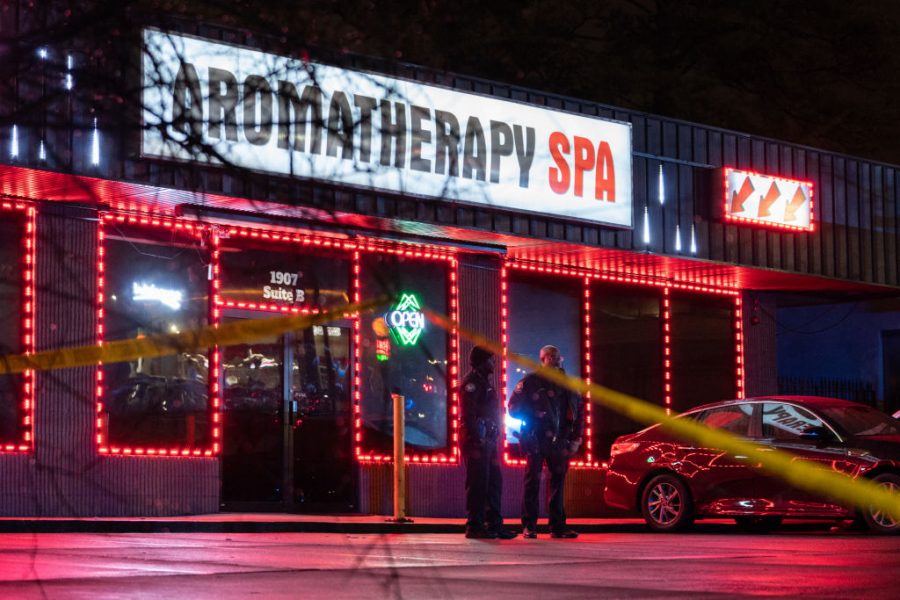Massage Parlor Shooting Displays Misogyny and Racism
Eight individuals were shot and killed on Tuesday, March 16 in an Atlanta massage parlor, a space long known for its role in the front-end of many prostitution rings. The man accused of committing this crime — killing six women of Asian descent — told authorities he had a “sexual addiction” and wanted to get rid of the temptation that the establishments represent. Having visited two out of three of the targeted spas prior to the murders and claiming to have received “special treatments” from these venues, the gunman was fully aware of the activities within and whom he planned on attacking.
Historically, the massage parlor industry has been surrounded by harmful stereotypes against Asian women. Many automatically assume a connection between massage parlors and sex work creating dangerous stigmas. These racist assumptions can easily lead to violence much like the shooting seen in Atlanta or various other unsolicited dangers.
An Atlanta Democrat, Bee Nguyen, says the killings emphasize “the vulnerability, the invisibility and the isolation of working-class Asian women in our country. And we know that vulnerability makes them targets.”
Simply put, the illicit massage parlor industry is built on hate crimes and prejudice against Asian women.
Asian American women are subject to stereotypes that contribute to their increased vulnerability to violence. On one hand, they are often presumed to be submissive, timid and docile. On the other hand, Asian women are labeled as hypersexual, which poses a perceived threat to American masculinity. These racist and misogynistic labels sexualize Asian American women as either helpless victims or perpetual threats. Together, these stereotypes are used as rationale for the normalization of sexual harassment and crimes against Asian American women.
These women worked in an industry at the brunt of fetishization that has remained the punchline of “dead hooker” jokes for decades. The shooter used their association with white men’s fantasies and their “unrespectable” occupation to justify his claim that their lives were inferior to his. The fetishization of Asian American women has remained a fundamental aspect of racism and misogyny for over a century.
Those who deny any tie between anti-Asian racism and these crimes should look no further than the 1875 Page Act. The Page Act was narrowly written to ban sex workers from “China, Japan or any Oriental country.” President Ulysses S. Grant made clear how he and many others viewed Asian women saying “few of whom are brought to our shores to pursue honorable or useful occupations.” In the 150 years following the Page Act, Asian American women continue to be stereotyped in ways that reinforce the nation’s perception of them and their sexuality as a moral danger.
The gunman’s defense — that he is not the perpetrator of a hate crime, but simply a sex addict in relapse — only furthers these racist assumptions and stereotypes. To believe his lie is to deny a clear history of unwavering bias against Asians.
Those who side with this man by claiming he just had a “bad day” continue to dehumanize and objectify vulnerable Asian Americans.
These shootings, a manifestation of utmost hate towards not only a profession or race but specifically towards a gender and profession of that race should serve as the country’s reminder that anti-Asian racism is almost always entangled with misogyny, and that anti-Asian violence often disproportionately targets Asian women. These attacks are being ignored and rationalized as no more than “targets of opportunity,” and defenders of the gunman’s views will continue to do so despite ongoing activism. Instead of reprimanding defenders of this gunman, the focus should be on highlighting the truth behind the crime with facts, proven stereotypes and history.
It is quite clear that these ignorant stereotypes oversexualize Asian American women. This baseless hypersexualization is used to justify the sexual harassment and hate crimes againt Asian American women. Now, in a growing number of cases, an increased risk of violence has become a much greater threat.
Chloe Giulini, FCRH ’24, is an international studies and journalism major from Stamford, Conn.










































































































































































































